Unban Center For WHMCS
Contents |
About Unban Center For WHMCS
| Unban Center For WHMCS allows your clients to easily unban IP addresses in such submodules as cPanel, DirectAdmin, InterWorx and Plesk, directly from your WHMCS. As an appealing alternative, the module will let you create your own submodules so as to integrate them with other systems and control panels. |
- Client Area Features:
| ✔ Automatically Detect And Unban IP Addresses From: |
| ✔ Control Panel |
| ✔ Control Panel Hosted On Client's VPS/Dedicated Servers |
| ✔ Unban IP Addresses From Control Panels Automatically After Logging In To WHMCS Client Area |
| ✔ Check If IP Address Is Banned |
| ✔ Show Reason Of Ban |
| ✔ Show All Banned IP Addresses On VPS/Dedicated Servers |
| ✔ View Time Left Until Next Available Unban Action |
| ✔ Auto Complete VPS/Dedicated Server Credentials To Unban IP Addresses |
| ✔ Receive Email Notification After Unbanning IP Address Automatically |
- Admin Area Features:
| ✔ View Dashboard Summary: |
| ✔ Enabled Products |
| ✔ Pending Tasks |
| ✔ Available Services |
| ✔ Last Cron Run |
| ✔ Configure Unban Features Per Product: |
| ✔ Toggle Unban Availability |
| ✔ Define Minimum Unban Delay - Protection From Abuse |
| ✔ Configure Unban Location On Control Panel |
| ✔ Prevent Clients From Unbanning IP Addresses Different Than Their Current One |
| ✔ Automatically Unban Clients After They Log In To WHMCS Client Area |
| ✔ Choose Email Template To Notify Clients About Auto Unban |
| ✔ Show Ban Reason Before Unban Attempt |
| ✔ Show All Banned IP Addresses On Client's Dedicated/VPS Server |
| ✔ Toggle Debug Mode |
| ✔ Define Global Blacklists Of Elements Not To Be Unbanned: |
| ✔ IP Addresses |
| ✔ IP Ranges |
| ✔ Unban Single Client From Chosen Product: |
| ✔ Hosting Account |
| ✔ Dedicated/VPS Server |
| ✔ Check If Client IP Address Is Banned |
| ✔ View And Delete Logs |
- Supported Modules:
| ✔ cPanel & cPanel Extended For WHMCS - CSF, cPHulk And Imunify360 |
| ✔ Plesk & Plesk Extended For WHMCS - Fail2Ban |
| ✔ DirectAdmin & DirectAdmin Extended For WHMCS - CSF And IPs Blacklist |
| ✔ InterWorx & InterWorx Extended For WHMCS - Native Firewall |
- General Info:
| ✔ Supports IPv4 And IPv6 |
| ✔ Requires MySQL 5.7 And Later For IPv6 |
| ✔ Intuitive Creation Of Additional Submodules |
| ✔ Multi-Language Support |
| ✔ Supports PHP 5.6 Up To PHP 7.3 |
| ✔ Supports WHMCS Template Six |
| ✔ Supports WHMCS V7.7 And Later |
| ✔ Easy Module Upgrade To Open Source Version |
Installation
| This tutorial will show you how to successfully install and configure Unban Center For WHMCS. We will guide you step by step through the whole installation and configuration process. |
| 1. Log in to our client area and download the module. |
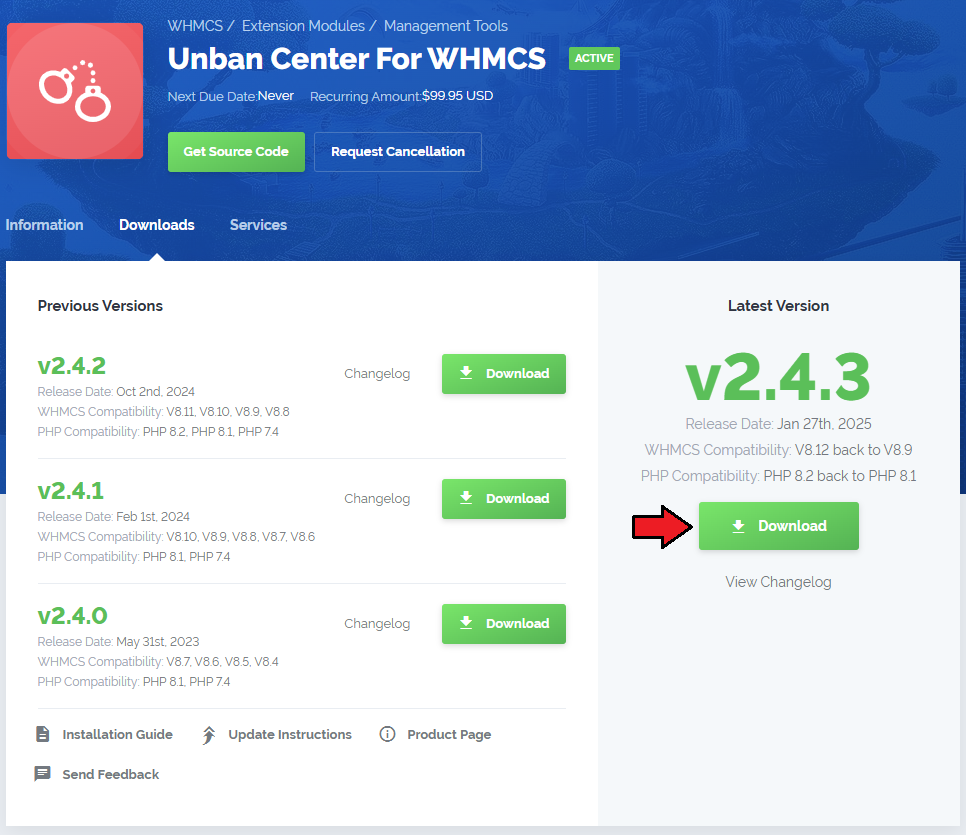
|
| 2. In the downloaded file you might find one or two packages that support different PHP versions. In the most recent versions of the module, you will find only one package that supports PHP 7.1 and later. |
| Previous updates of the module may contain two packages dedicated to various PHP versions. The first one that supports PHP 5.6 up to PHP 7.0, and the second one addressed to PHP 7.1 up to PHP 7.3. |

|
| Important: This situation does not affect the open source version of this module which can be applied to any PHP from version 5.6 and later. Note: You can check the current PHP version in your WHMCS. To do so, proceed to 'Utilities' → 'System' → 'PHP Info'. |
| 3. Once you have chosen the package with the right PHP version, extract it and upload its content into the main WHMCS directory. The content of the chosen PHP version files to upload should look like this. |

|
| 4. When you install Unban Center For WHMCS for the first time, you have to rename the 'license_RENAME.php' file. The file is located in 'modules/addons/unbanCenter/license_RENAME.php'. Rename it from 'license_RENAME.php' to 'license.php'. |
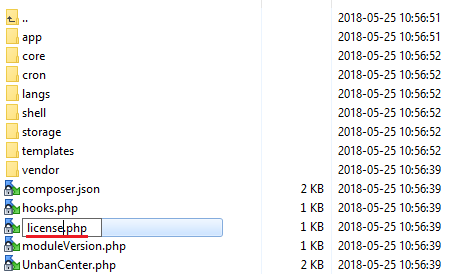
|
| 5. In order to configure your license key, you have to edit the previously renamed 'license.php' file. Enter your license key between the quotation marks as presented on the following screen. You can find your license key in our client area → 'My Products'. |

|
| 6. In the next step, set up the 'storage' folder as recursively writable. This folder is available at 'your_whmcs/modules/addons/unbanCenter/' . |
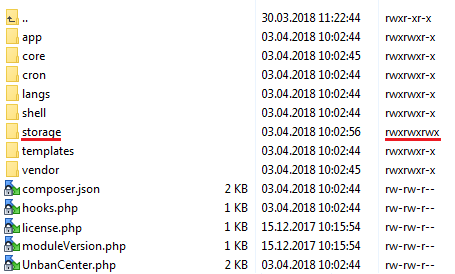
|
| 7. Now you have to activate the module in your WHMCS system. Log in to your WHMCS admin area. Go to 'Setup' → 'Addon Modules'. Afterwards, find 'Unban Center' and press the 'Activate' button. |
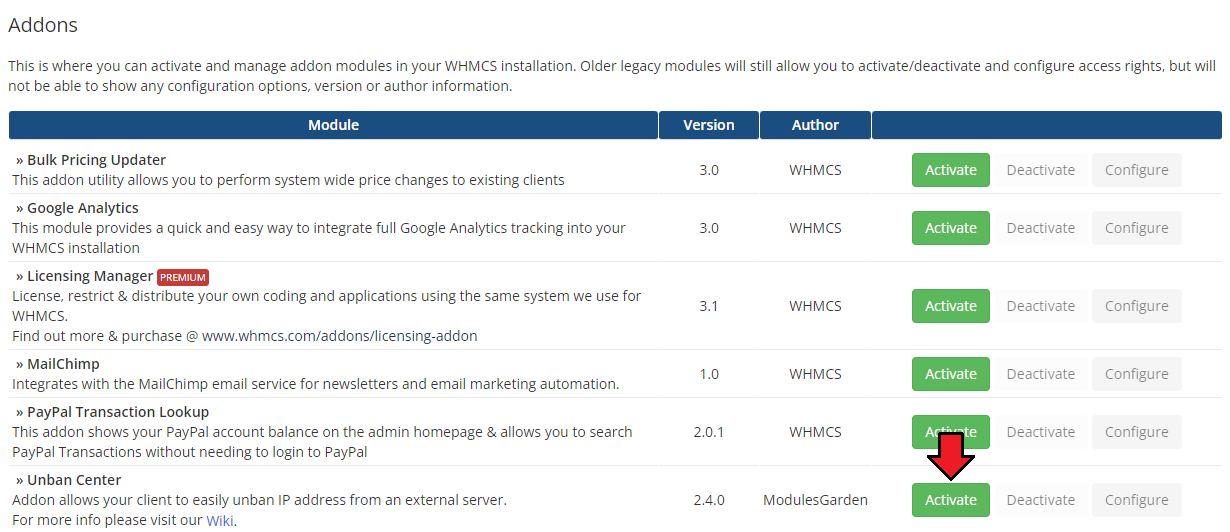
|
| 8. In the next step you need to permit access to this module. To do so, click on the 'Configure' button, tick 'Full Administrator' and press 'Save Changes'. |
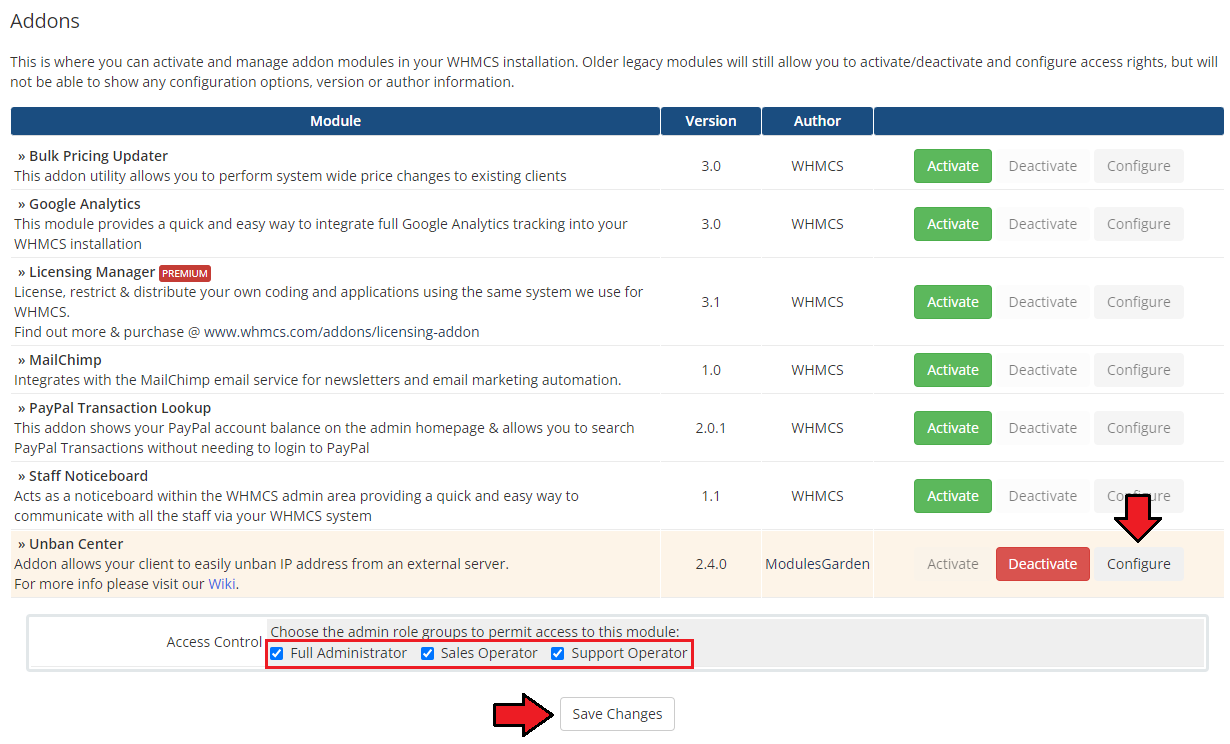
|
9. Finally, set up the cron command line provided below and define its frequency (5 minutes interval is suggested).
php -q /yourWHMCS/modules/addons/unbanCenter/cron/cron.php Tasks This will allow to enable the feature which automatically unbans customers' IP addresses after they log in to the WHMCS client area. rm -r /yourWHMCS/modules/addons/unbanCenter/storage/crons/* This will allow you to run the cron process again next time. Do not forget to replace 'yourWHMCS' with your WHMCS root location. |
| 10. You have just successfully installed Unban Center For WHMCS! You can access your module at 'Addons' → 'Unban Center'. |
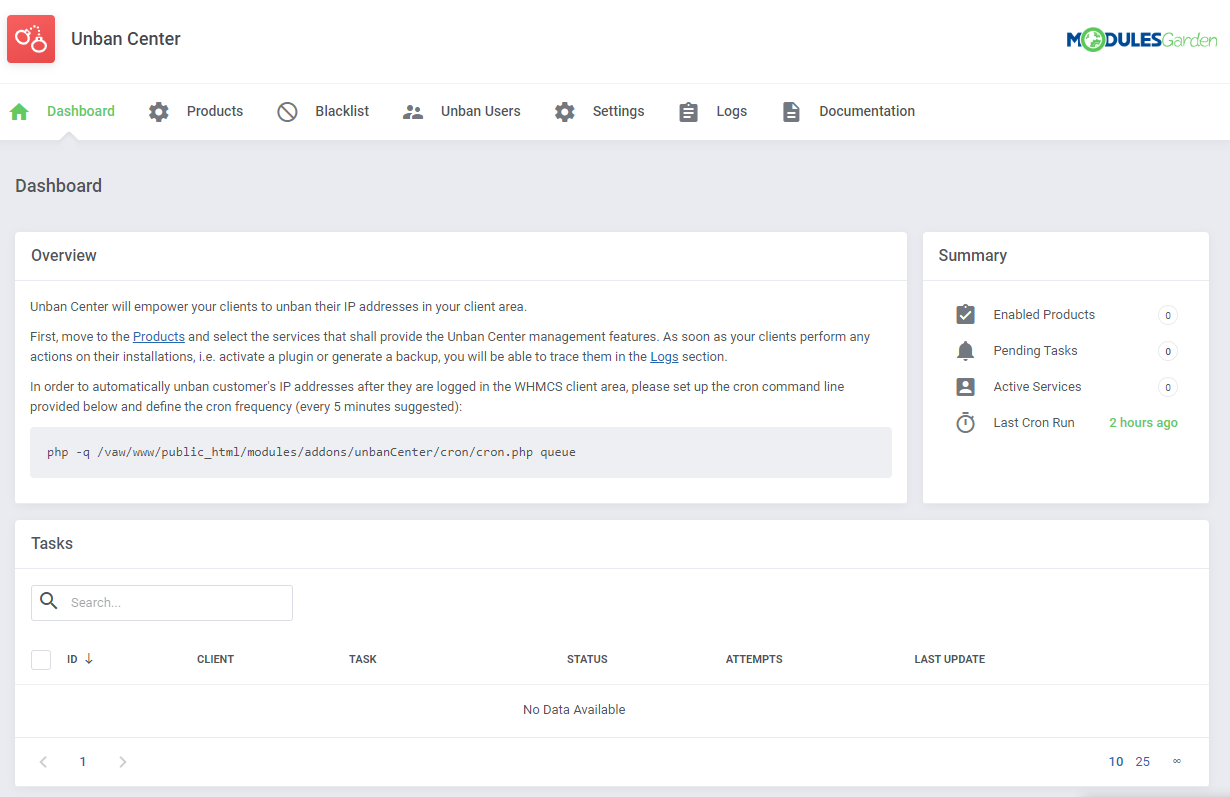
|
Configuration and Management
| Unban Center For WHMCS allows you to provide your clients with an ability to easily unban desired IP addresses from external servers. Additionally, you are able to protect specific IP addresses from the unban action. |
Unban Types
| Our module has been designed in such a way so as to allow you to manage banned IP addresses on several different panels of a particular type. These are:
It is also possible to unban only the current IP address. You simply need to select such option (i.e. Allow User To Unban Current IP Address Only) |
Dashboard
| In dashboard you can find the summary of currently enabled unban configuration for products, pending tasks, active services and last cron run. The tasks list allows you to follow the current auto-unbans for the clients who log in to their WHMCS client area (the option may be enabled in products configuration). These will be performed via cron. |
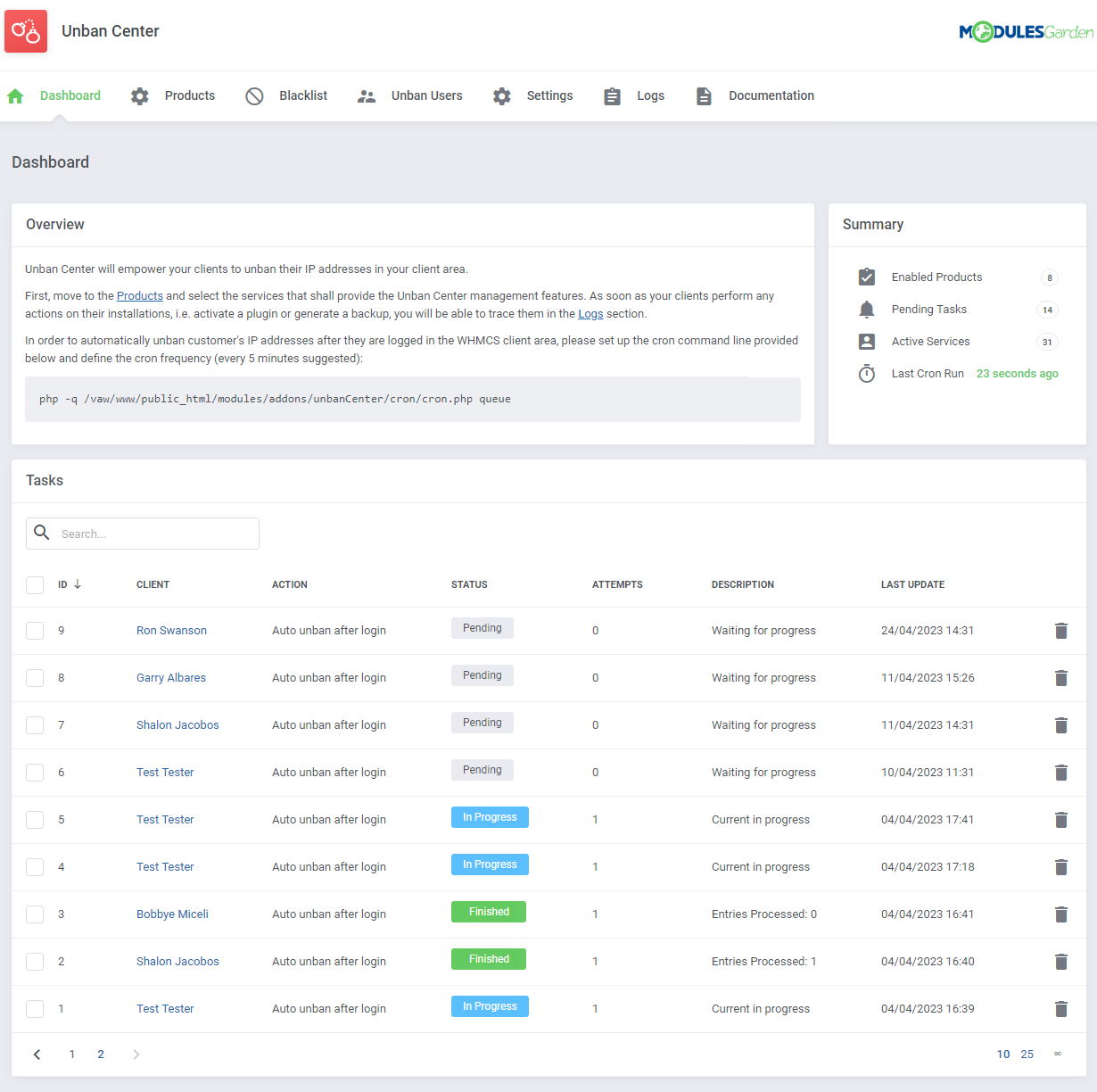
|
Configuration of Products
| Here we show you how you can easily enable and configure unban action for your selected products. Let us show you how to enable unban functionality for cPanel Extended product. |
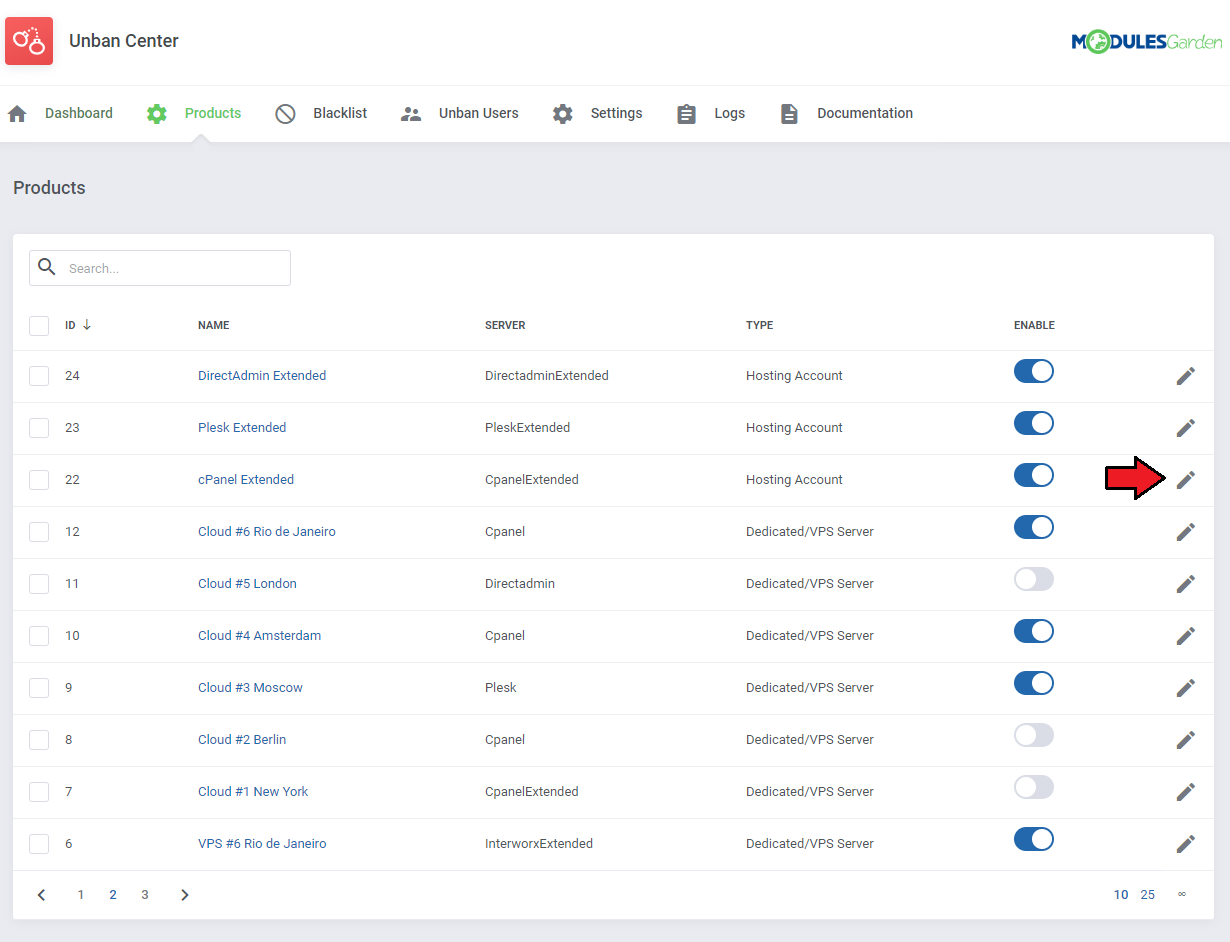
|
| Press 'Enable' and then define 'Minimum Delay Time' intervals to declare how often your client will be able to perform unban action on a specific product. Next, enable the desired unban type/types. For cPanel there are:
Additionally, you can permit your clients to unban their current IP address as well as automatically unban them after they log in - Auto Unban After Login to client area (cron execution is required). Select the email template that will be used to notify clients when their IP address has been automatically unbanned. You can also allow your clients to see all banned IP addresses' from the panel on their VPS/Dedicated Servers.
|
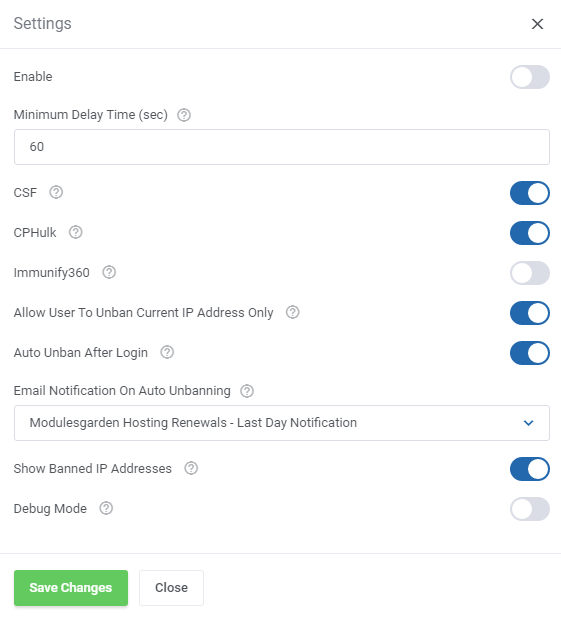
|
Configuration of Blacklists
| The blacklist section allows you to create lists of IP addresses that cannot be unbanned from your panels. This section is divided into two tabs. The first one allows you to create a blacklist of a single IP addresses. |
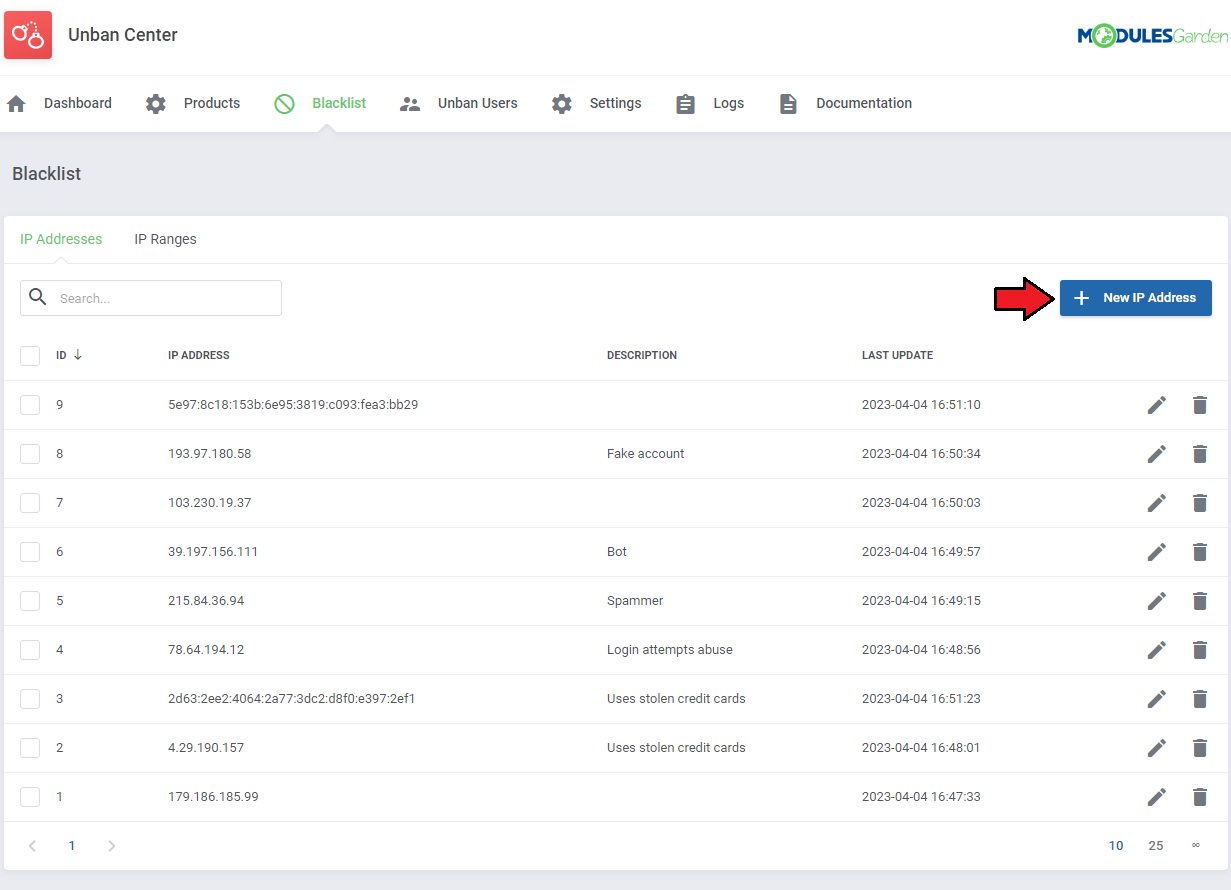
|
| Next, provide IP address you want to add to the blacklist (either in IPv4 or IPv6 format). Additionally, you can provide a description for easier identification. |
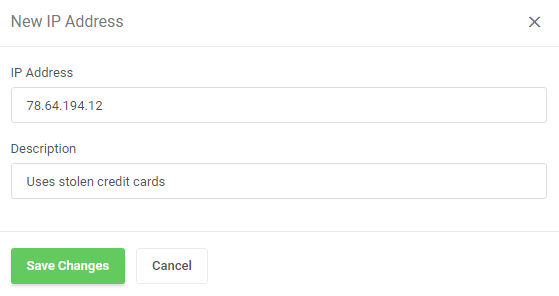
|
| The second, 'IP Ranges' tab allows you to define entire ranges of IP addresses that will be prevented from being unbanned. Press 'New IP Range' to add a new blacklisted range. |
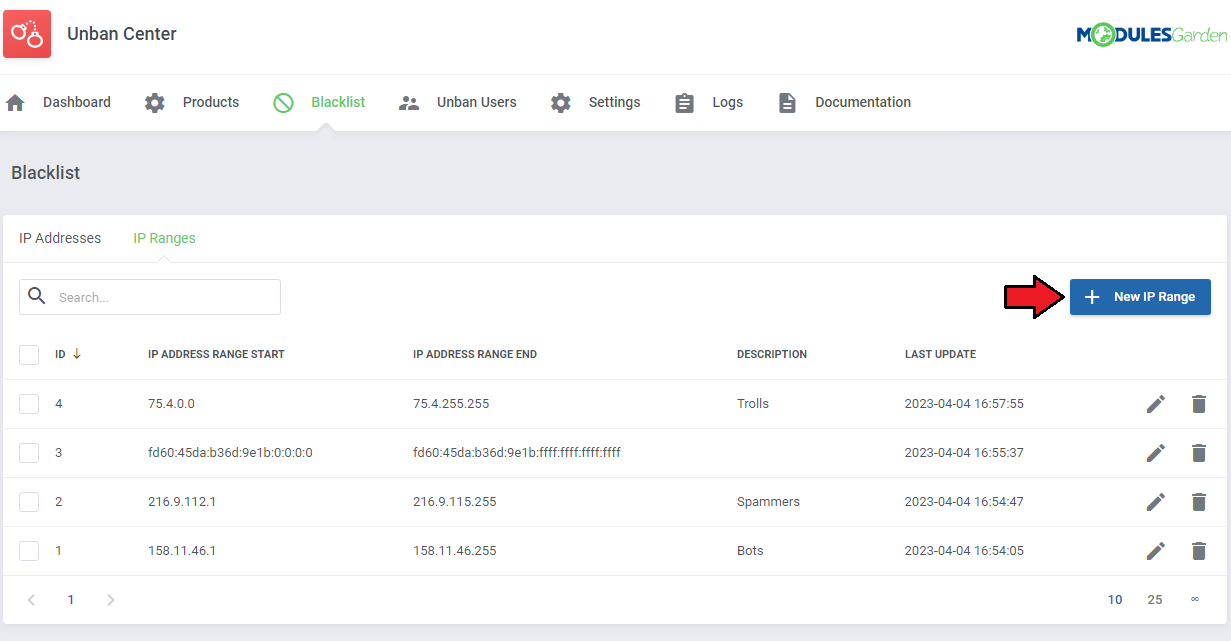
|
| Now, provide the start and end of IP addresses range (in either IPv4 or IPv6 format). Additionally, you can provide a description for easier identification. |
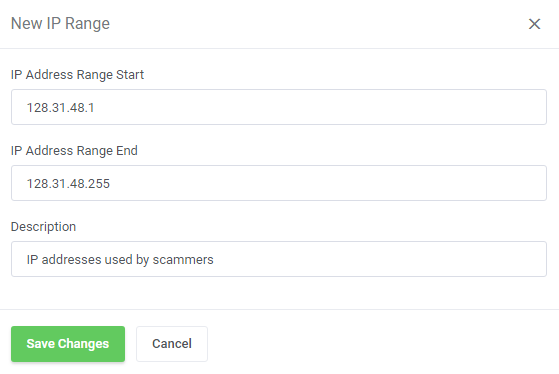
|
Unban Users
| This section allows you to unban your client's IP address from any external server on which they own an account. You can unban IP address assigned to your client's account as well as any custom IP address. |
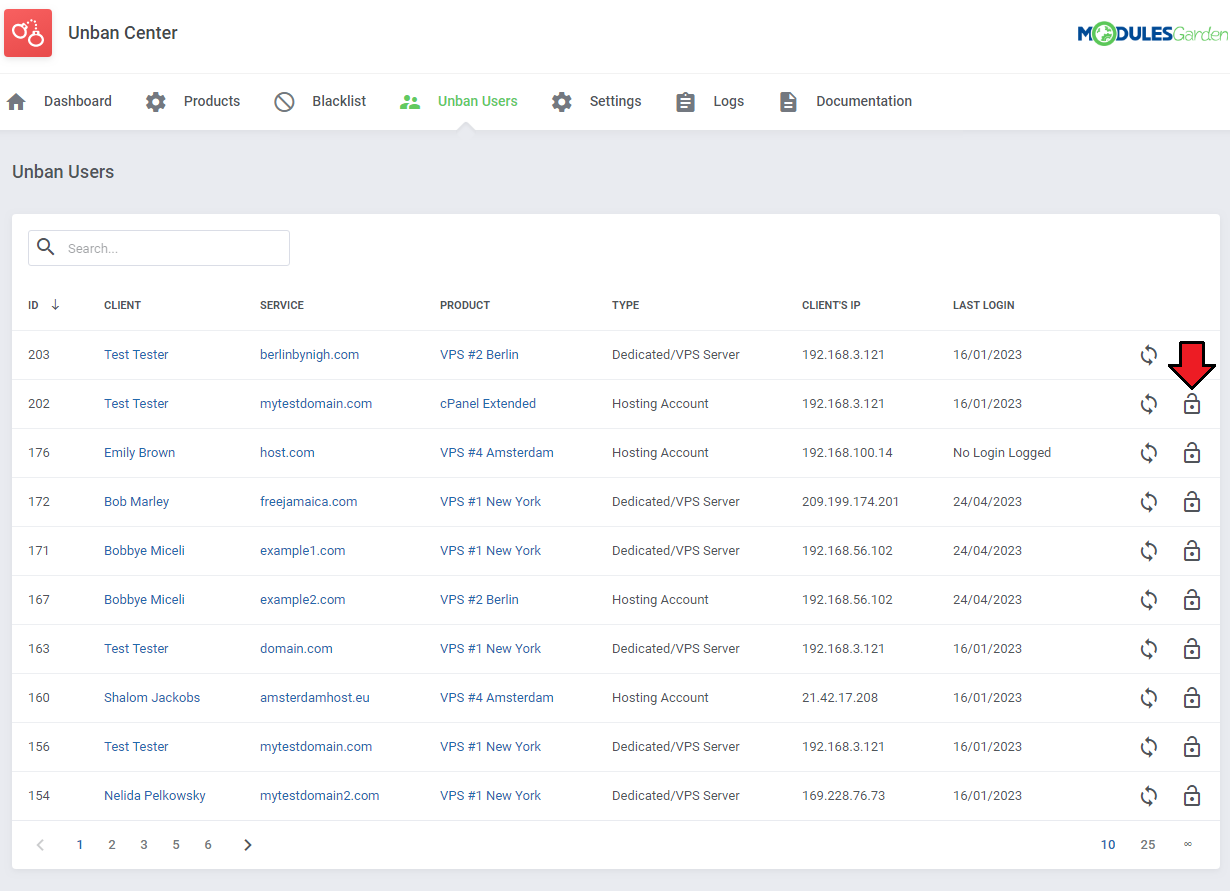
|
| Data on 'Username' , 'Password' and IP address will be filled in automatically. You can optionally add a custom hostname as well as add port number and select SSL connection. Next, leave the default client's IP address to unban or provide a custom one. Note: These connection details will appear only in case of dedicated/VPS products used by the client. For hosting accounts, only 'IP Address To Unban' field is available. |
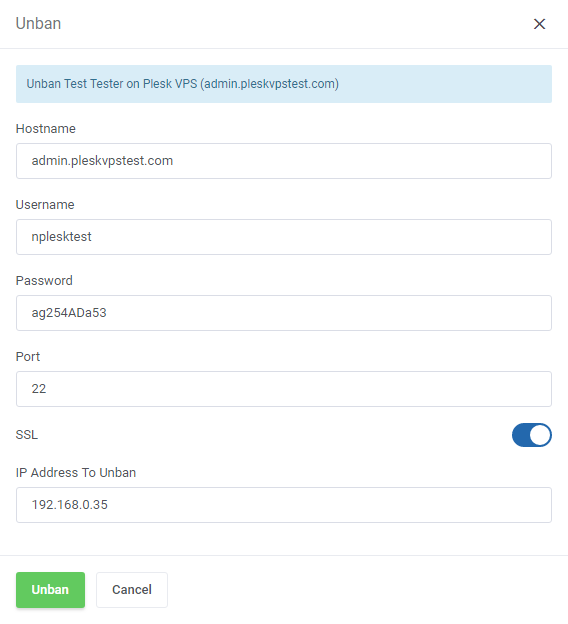
|
| You may also check if the client's IP address has a banned status without unbanning it. Simply press 'Check Status' on the users list. |
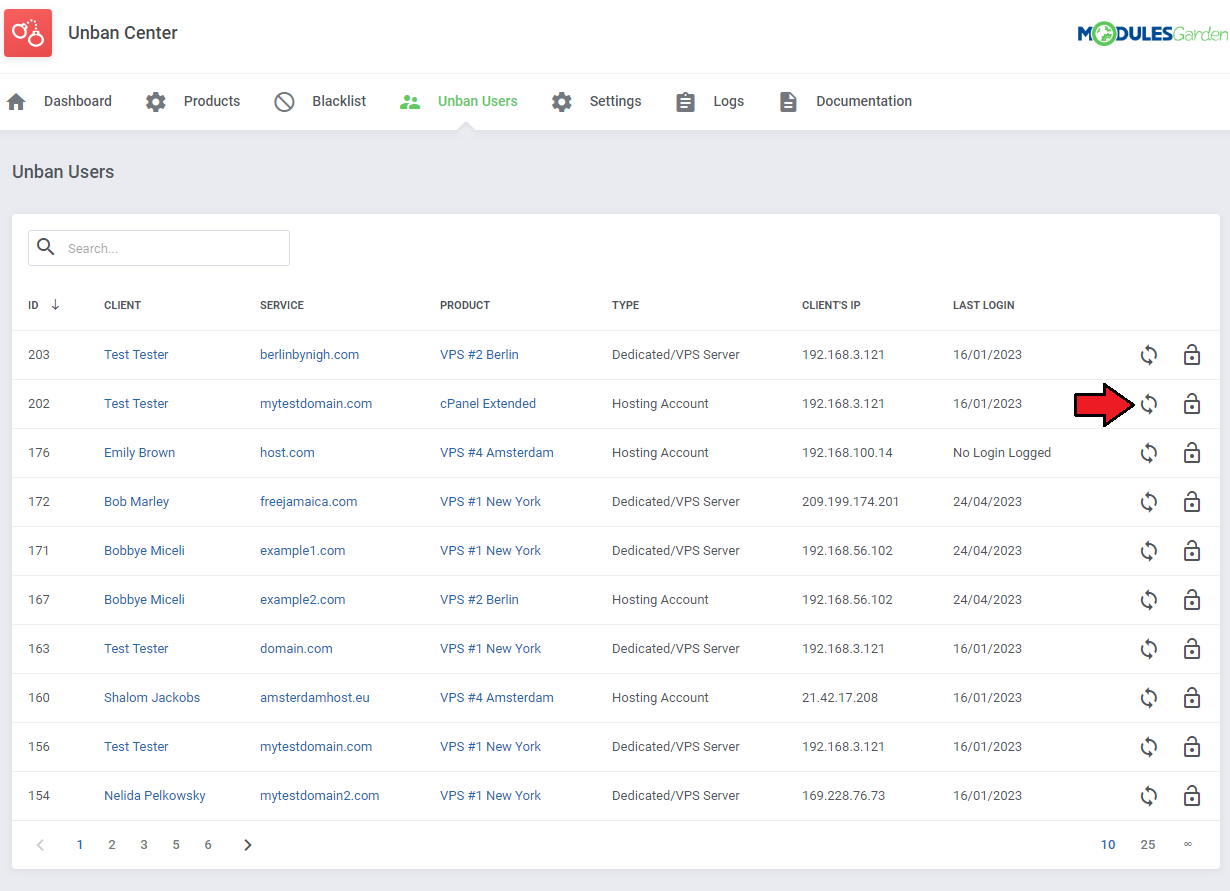
|
| Now, use the default client's IP address or, alternatively, provide a custom IP address to check its ban status on the control panel. |
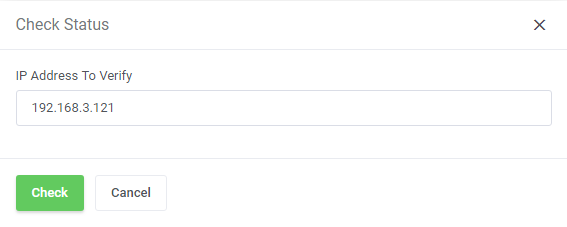
|
Logs
| All unban requests and their results can be found in the 'Logs' section. You can find here information related to user or admin who requested unban action and its date. |
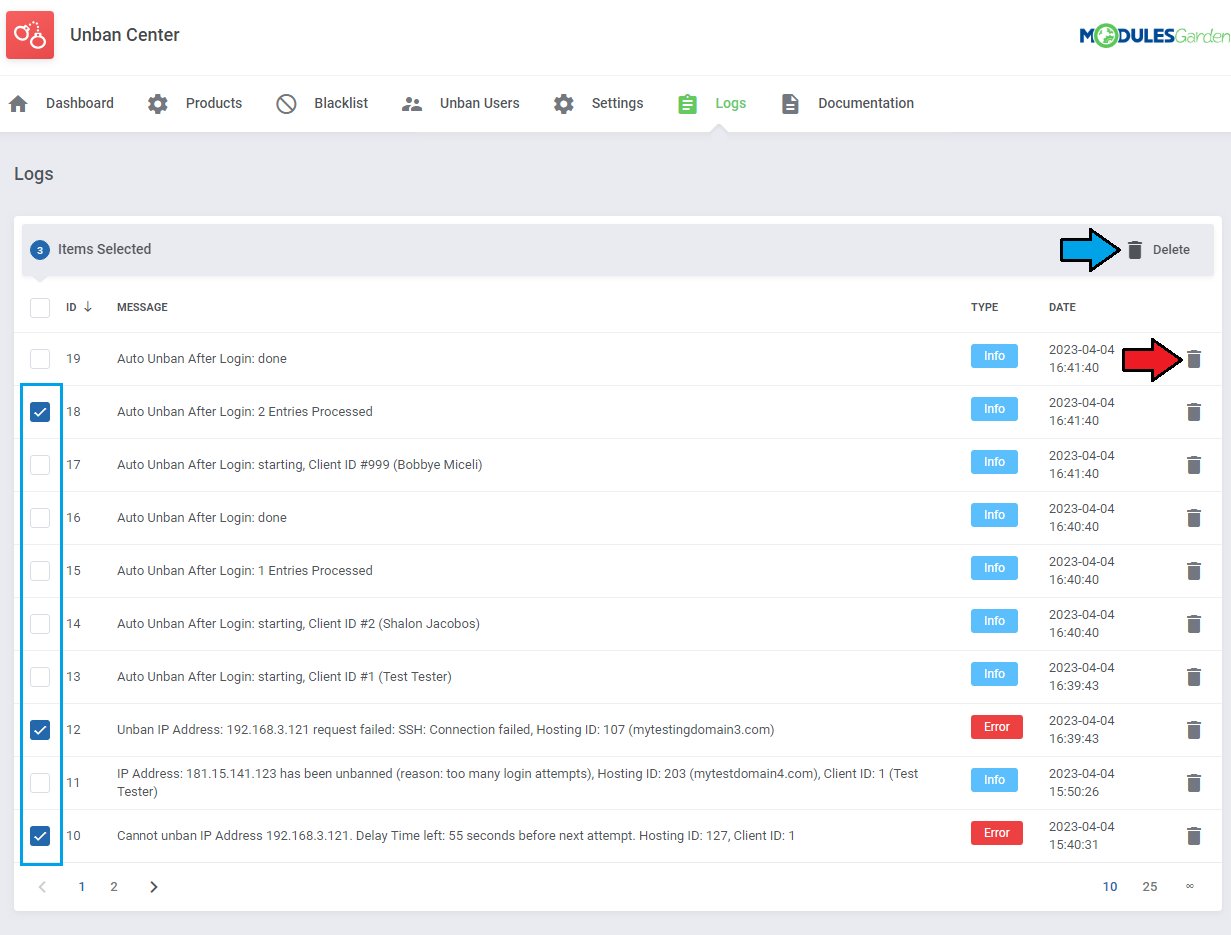
|
Client Area
|
Let us proceed to the client area → 'Services' → 'My Services' in order to try out the unban action. |
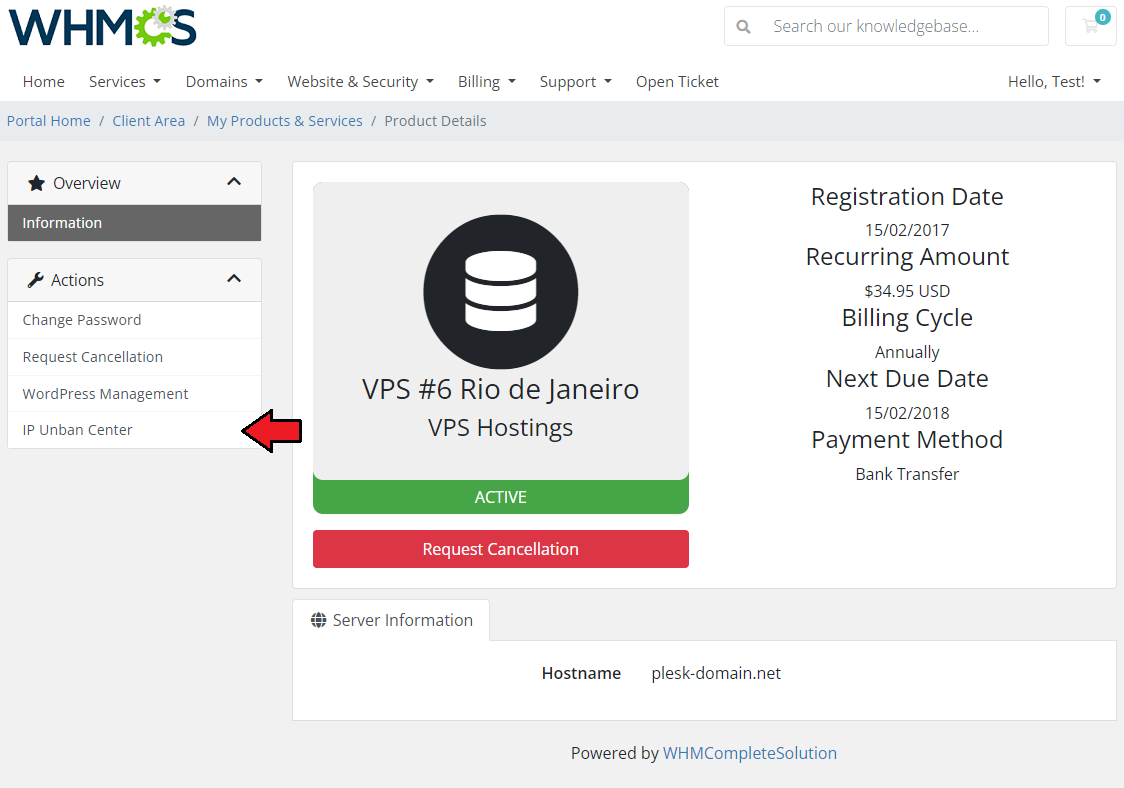
|
| Now, select the product for which you want to perform action of unbanning an IP address. |
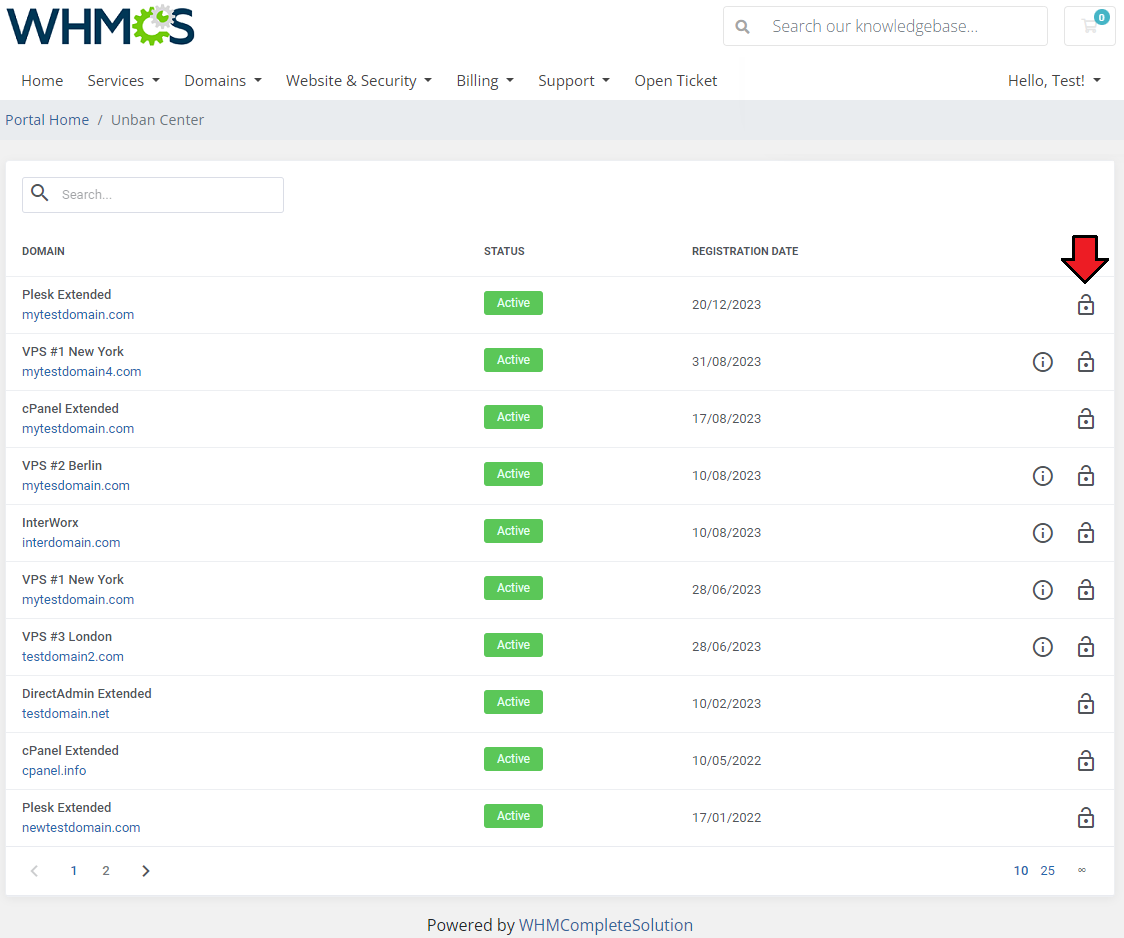
|
| Data on 'Username' , 'Password' and 'IP address' will be filled in automatically. Optionally, you can also add a custom hostname as well as add port number and select SSL connection. Next, leave the default client's IP address to unban or provide a custom one. |
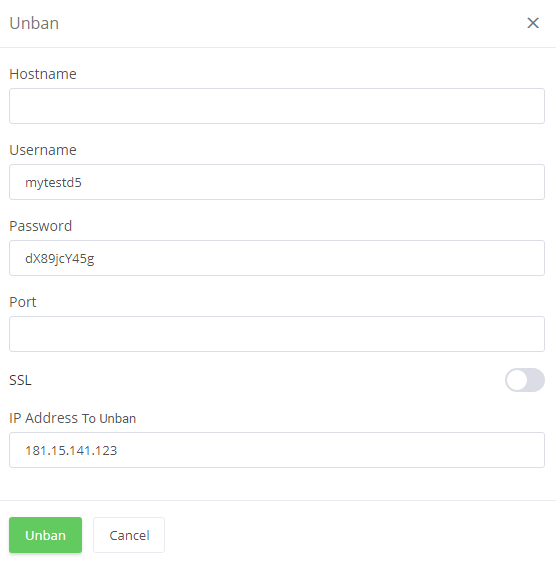
|
| Note: These connection details will appear only in case of dedicated/VPS products used by the client. For hosting accounts, only 'IP Address To Unban' field is available. |
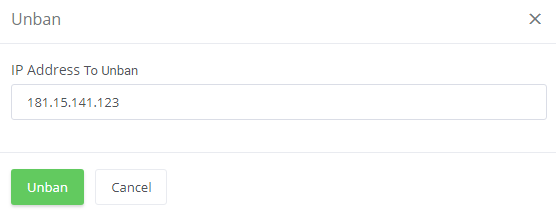
|
| Once the action is completed, the IP address will be unbanned immediately and you will be notified about the results. |

|
| In case you have set up a low delay time, you will need to wait for the next unban attempt. |
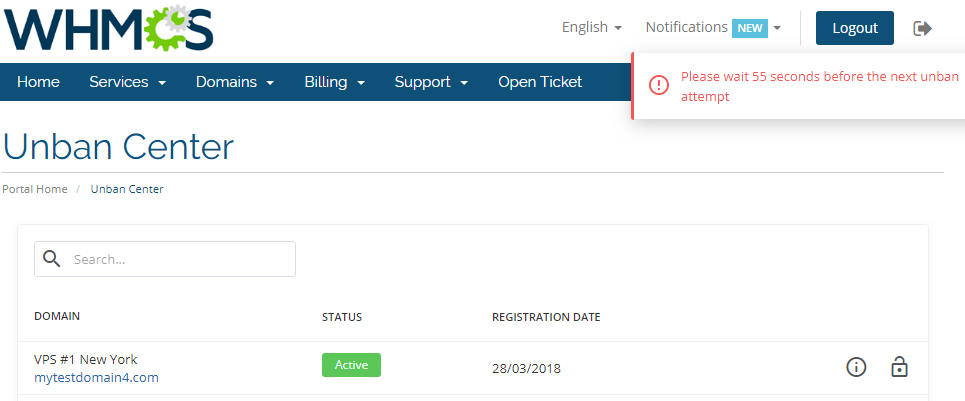
|
| If enabled, the option will allow your clients to preview all banned IP addresses on the server. Important: This feature is only valid for dedicated/VPS servers. |
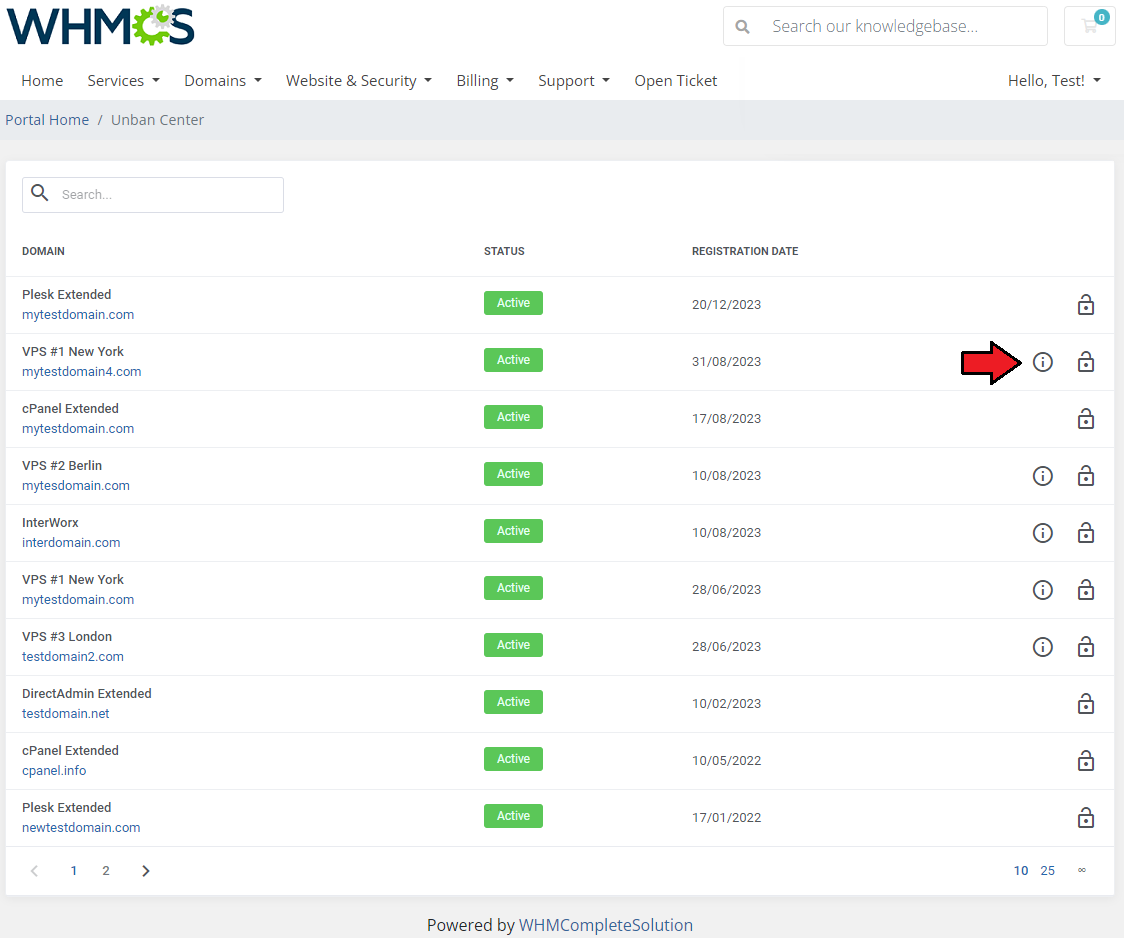
|
| When you try to open this section for the first time, the 'Server Details popup may show up. Provide your control panel credentials and press 'Connect' . |
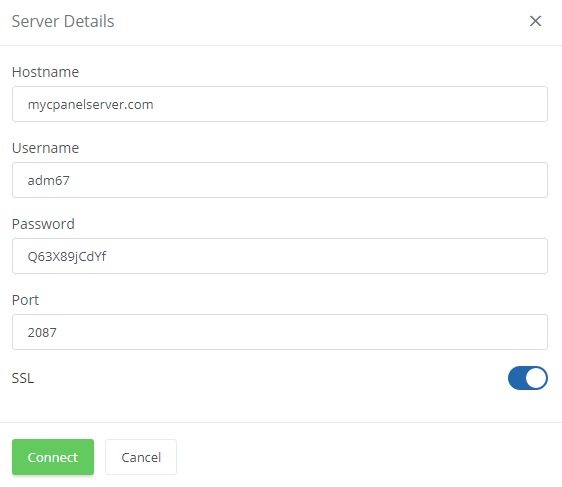
|
| Here you can see the list of all banned IP addresses on the control panel of a server. You can unban them in the same way as explained in the previous steps. |
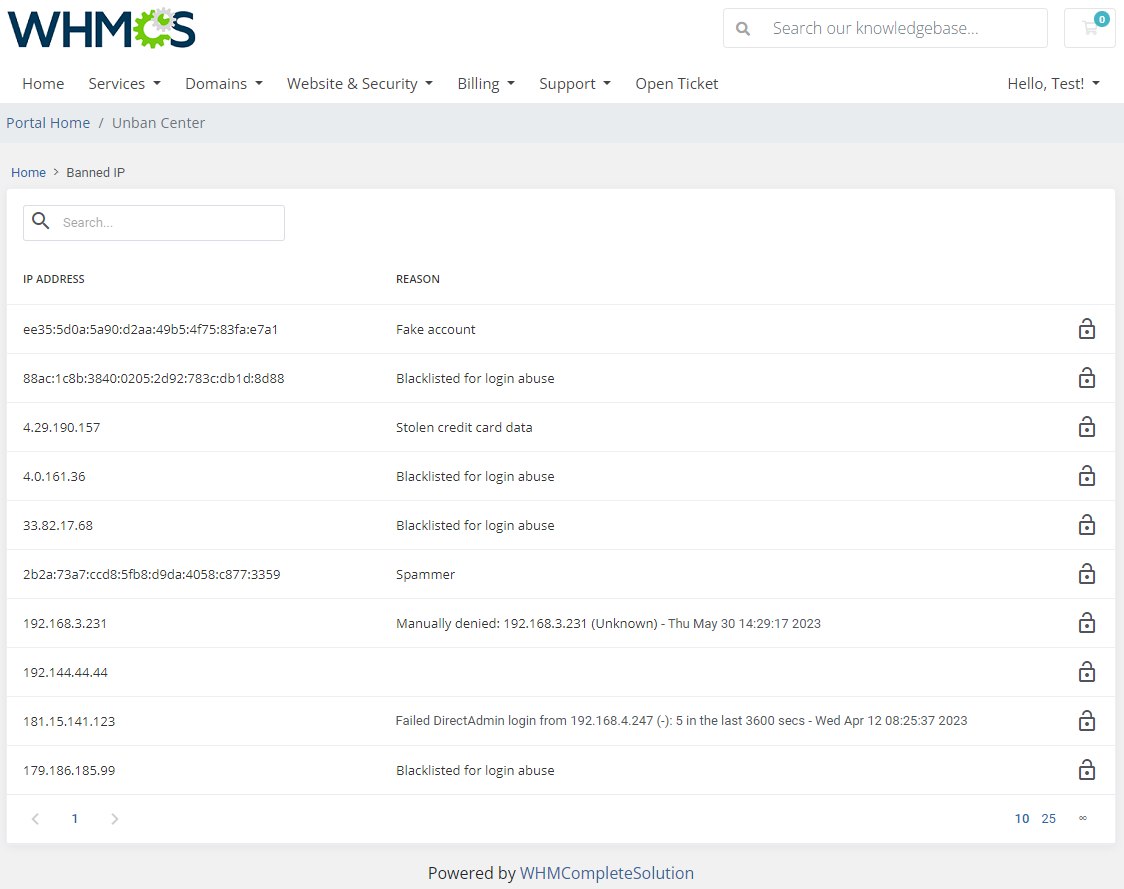
|
Tips
| 1. Provided data to connect with a server and view a list of banned IP addresses will be stored and available to use when trying to connect another time. Keep in mind that in case the connection data have changed, simply provide new data in the adequate fields and they will override the previous ones. |
Creating 3rd Party Submodule
| The main goal of Unban Center For WHMCS is to allow you to quickly and easily create additional submodules. All you need is a little knowledge of PHP programming language and documentation of integrated module API. |
| Start with renaming the copy of the 'Sample' folder to the name used by your 3rd party module. Let us say that the folder with the module you wish to integrate with Unban Center For WHMCS is located in 'your_whmcs/modules/servers/' and is named 'DummyIntegration'. |
Update Instructions
| An essential guidance through the process of updating the module is offered here. Note: Updating the module from any version prior to 2.0.0 will start the migration process to move settings configured in the previous version to the new one. |
Common Problems
| 1. When you have problems with connection, check whether your SELinux or firewall does not block ports. |
| 2. After update, some functionalities are not working properly. Cause: Your browser stores old JavaScript in its cache. |
| 3. If you were using any version of the module prior to 2.0.0, note that after upgrading to the latest version the template integration code is no longer needed. |
| 4. If you are getting 'Syntax error or access violation' errors when using an address in IPv6 format, make sure that MySQL 5.7 or higher version is installed. |